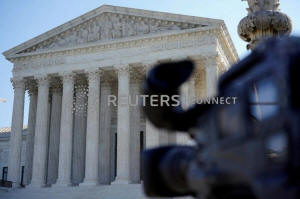|
Supreme Court to hear biggest gun rights
case since 2010
 Send a link to a friend
Send a link to a friend
 [January 23, 2019]
By Andrew Chung and Lawrence Hurley [January 23, 2019]
By Andrew Chung and Lawrence Hurley
WASHINGTON (Reuters) - The
conservative-majority U.S. Supreme Court on Tuesday took up its biggest
gun rights case in nearly a decade, agreeing to hear a challenge backed
by the influential National Rifle Association lobby group to New York
City's strict limits on handgun owners transporting their firearms
outside of the home.
The nine justices will review a 2018 lower court ruling upholding the
city's restrictions after three gun owners and the NRA's New York state
affiliate sued claiming the regulations imposed in the largest American
city violated the U.S. Constitution's Second Amendment right to "keep
and bear arms."
The decision indicates a new interest regarding gun rights on the court,
where conservatives hold a 5-4 majority. The Supreme Court had not taken
up a major firearms case since issuing important rulings in 2008 and
2010 that established an individual right to own guns for self-defense
inside the home.
The court's conservative wing has been bolstered in the past two years
by President Donald Trump's appointment of Justices Neil Gorsuch and
Brett Kavanaugh. Kavanaugh last year replaced the retired conservative
Justice Anthony Kennedy, who sometimes sided with the court's liberals
on high-profile social issues.

The issue of gun rights is contentious in the United States, which has
experienced a succession of mass shootings in recent decades and calls
from many Americans for stricter regulation of firearms and ammunition.
But, citing the Second Amendment, the NRA and gun rights activists have
consistently resisted any major gun control measures.
"The issue in the case seems small, but the implications could be
tremendous," said Adam Winkler, a professor at the University of
California Los Angeles School of Law.
Although a ruling striking down the restrictions would not necessarily
have broad impact, the court's majority could use the case to set a new
precedent that makes it easier for gun rights activists to challenge
other regulations, Winkler added.
The New York case concerned people who have licenses to possess guns at
home, known as "premises" licenses, and already are allowed to take
unloaded guns to shooting ranges within New York City. The plaintiffs
said the city's rules forbidding them from taking their guns to ranges
or other homes outside city limits amounted to a "draconian" transport
ban in violation of the Second Amendment.
[to top of second column]
|

The Supreme Court is seen ahead of the start of its current term in
Washington, U.S., October 1, 2018. REUTERS/Aaron P. Bernstein/File
Photo

Premises licenses are different from "carry" licenses, which give
holders broader freedom to take guns outside the home and are not at
issue in the case.
The gun owners and the New York State Rifle & Pistol Association, an
NRA affiliate, filed suit in 2013 challenging the transport limits
in federal court in New York. The 2nd U.S. Circuit Court of Appeals
in Manhattan last year rejected the constitutional challenge and
said the restrictions advanced the city's interest in protecting
public safety.
The appeals court said the restrictions did not run afoul of the
Supreme Court's 2008 ruling that found for the first time that the
Second Amendment protected an individual's right to gun ownership
under federal law, specifically to keep a handgun at home for
self-defense. The high court in 2010 extended that right to state
and local laws as well.
Since then, the justices had avoided taking up another major
firearms case, despite gun rights proponents' repeated attempts to
extend those rights to other types of weapons and the hotly
contested question of to what extent that right applies outside the
home.
In recent years, the court has left in place assault-weapons bans in
New York, Connecticut and Maryland, as well as laws over gun waiting
periods and concealed-carrying permits in California.
The case will be heard and decided in the court's next term, which
starts in October and ends in June 2020.
(Reporting by Andrew Chung and Lawrence Hurley; Editing by Will
Dunham)
[© 2019 Thomson Reuters. All rights
reserved.]
Copyright 2019 Reuters. All rights reserved. This material may not be published,
broadcast, rewritten or redistributed.
Thompson Reuters is solely responsible for this content.

 |